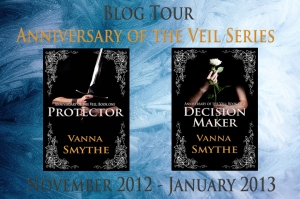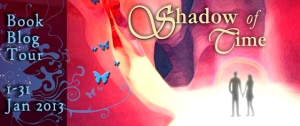Okay, I’ve got a story. It’s a sort of scary one. I think independent/self-publishing authors need to know about it, and telling it carefully and correctly is also important for my own situation, so I’m going to take my time and lay it all out in order.
Pressed for time? You can skip to the bottom for the TL;DR summation.
 On Friday, February 27, 2015, I noticed that my bookmarked Amazon.com link to my first novel, Nolander, was yielding, “We’re sorry. The Web address you entered is not a functioning page on our site.” I went to my Amazon dashboard and discovered the book had been blocked.
On Friday, February 27, 2015, I noticed that my bookmarked Amazon.com link to my first novel, Nolander, was yielding, “We’re sorry. The Web address you entered is not a functioning page on our site.” I went to my Amazon dashboard and discovered the book had been blocked.
In my spam folder, I discovered an email from Kindle Direct Publishing (KDP), Amazon’s self-publishing arm, informing me that someone had sent in a DMCA notice. In response, Amazon had summarily blocked Nolander from sale.
“DMCA” stands for “Digital Millennium Copyright Act.” It’s a Clinton-era U.S. law that lays forth a process for dealing with copyright infringement online. If you find material online that infringes a copyright you hold, you can send the hosting website a DMCA notice; in order to be in compliance with U.S. law, the hosting website has to remove the material and notify the person who posted it.
When I heard a DMCA notice had been filed against Nolander — which is a completely original work — I assumed a reader had reacted badly after reading the book in a boxed set and then finding it available as a standalone. It could be confusing to find the same material in different places, after all. A vigilant reader might think something fishy was going on. So I wrote back to KDP, sending them my U.S. copyright registration info and assuring them that Nolander was my work.
Soon after, I found an email notification from Smashwords as well. That one was a little more informative:
Hi [my real name redacted],
I have just unpublished your book Nolander, formerly found here: https://www.smashwords.com/books/view/272292
As we received a DMCA Notice and I was able to verify that the text in your book, published on Jan. 07, 2013, matched the text of a book made public on August 2nd, 2011.
If you have any questions or can give me critical information about the book, please do. Per our policy, the book needs to remain unpublished until Smashwords is given consent by both parties to republish it.
Thank you for your understanding.
Cheers,
*[name redacted] – Smashwords Support Team*
This was mystifying. I could imagine a vigilant, informed reader emailing Amazon about copyright concerns, but hunting around on other retailers for the book and contacting them? That seemed strange. I started to get a little worried.
I poked around on my hard drive and found a finished draft of Nolander dating from March 29, 2012. It’s the one I sent my husband so he could help proof the manuscript. I have it in mind that the book took about three months to write and a month to edit, so I probably began writing it in November or December 2011. August 2011 was situated conveniently before my writing would’ve begun.
Still, I figured Ockham’s Razor dictated this was an instance of boxed-set-related confusion. I’d seen such confusion arise for another author, though that confusion didn’t progress to a DMCA, so far as I know. Perhaps, I told myself, the Smashwords rep had been using a form letter and had neglected to replace “August 2nd, 2011” with the correct publication date for the boxed set.
I wrote back to Smashwords with the same info I’d sent Amazon. Then I proactively contacted the other platforms where Nolander is available, hoping to head off any further take-downs.
Also in my email was a notification for a pending comment on my website (I have to personally approve comments from first-time commenters):
Kelvin
February 28, 2015 at 3:21 AM
I can’t find Nolander on Amazon. The link is returning “Page Not Found”. I only found a Print Edition on Amazon which cots $15 ! But I find Nolander on other stores like B&N.
Have you removed your book from Amazon? Sorry but I only download or buy books from Amazon. Please consider your decision again.
You can see the comment toward the bottom of my books page on this site. I approved the comment and responded:
Becca
February 28, 2015 at 7:31 AM
Hi, Kelvin. Yeah, someone apparently sent Amazon (and Smashwords also) a DMCA (Digital Millennium Copyright Act) notice. That means they think the book infringes on a copyright. But I am the copyright-holder for the book, so I assume this is some kind of mix-up. The book will be unavailable until Amazon figures out what’s going on. Very annoying!
You can email me at bccamills@gmail.com, and I’ll send you a PDF. Kindles can display those.
Folks who know my email address might notice I typed it wrong, but Kelvin tracked me down anyway. I got this email on Saturday:
Regarding Your DMCA Problem
Kushal Das <kushaldas.usa@gmail.com>
Sat 2/28/2015 12:10 PM
Hello Becca,
I am Kushal, who posted on your blog with the screen name Kelvin. I have experience with various aspects of online business including DMCA process, hence I thought about contacting you.
Since you are saying that there has been problems both at Amazon and Smashwords, are you sure that it’s a mix-up? That would be quite unlikely. I don’t know about Indie Fiction Authors but in case of Webmasters, YouTubers and Indie Non-Fiction Authors, DMCA process is often abused. Are you sure someone is not deliberately doing this? Anyway, if the problem does not get resolved then you can let me know what Amazon is saying and I will see what can be done.
Paranormal authors with unique story telling angles are damn hard to find, so I don’t want you to go through this. A malicious DMCA attack can end a person’s career (happened with many YouTubers).
That’s why I am concerned. I hope you won’t find it creepy.
If possible, you can send me a pdf of Nolander.
P.S: I don’t live in USA. I live in India but I am currently going to take the GMAT and I use this email address to communicate with various American B-Schools.
Best Regards
Kushal Das
“How kind!” I thought. I set it aside to respond later. That’s the great thing about indie publishing: people come out of the woodwork to help you. It’s amazing.
At that point, KDP got back to me:
Hello,
As stated in our previous communication, we’ve received notice from a third party regarding copyright concerns over B007R6PPZA Nolander (Emanations, an urban fantasy series Book 1) by Becca Mills. We don’t involve ourselves in third party disputes and therefore have removed the availability of the book through our systems until this matter is resolved.
Here you will find information on the party that submitted the notice:
Rajesh Lahoti
theeroticaauthor@gmail.com
If a resolution is reached, before we may take any appropriate action regarding the book(s), all involved parties must contact us via title-submission@amazon.com.
Best Regards,
[name redacted]
Amazon.com
So, my proof of official, pre-publication U.S. copyright was not going to be enough. In order to get Nolander restored, both the DMCA complainant and I would need to write to Amazon giving permission. This was alarming. What if Rajesh Lahoti never responded? All they’d have to do was ignore my queries, and Nolander would never appear on the Amazon storefronts again.
A friend I spoke to about the situation pointed out how easy it would be to make my April 2012 book appear to rip off material from an August 2, 2011 book – all someone would have to do is take a book published August 2, 2011, stick a bit of Nolander into it somewhere, upload the new file, and then point Amazon/Smashwords at the new version. It doesn’t take much for a book to appear to be in copyright violation, right? Anything that’s not fair use is a violation. I bet a single paragraph would do it. Who knows? Maybe less.
This too was alarming.
I dashed a quick, neutral email off to Rajesh Lahoti saying I’d been informed of the DMCA notice by Amazon and asking for more info about their copyright concerns. I was still hoping this was an honest mix-up.
Then I turned back to Kushal Das’s generous email offering to help me with my “DMCA problem.”
Reading it again, I began to have some doubts. If Kushal was already a fan of my writing, why had they been trying to download the first of my series from Amazon? Hadn’t they already read it? And it sure was coincidental that they had emailed me about Nolander’s absence from Amazon the very day it happened.
So I wrote a careful response, trying not to give away anything new and yet not wanting to assume the worst of someone who was quite possibly a genuine good Samaritan:
Hi, Kushal. Thank you for the lovely compliments! I’m so glad you like my writing. :)
Here you go – attaching Nolander. This is actually the brand-new revised copy, which I’m just now having formatted. If you’d like a copy of the older edition, which is the one you would’ve read, just let me know. I have that too. I’m planning to make the new edition available on my website for existing readers to download, if they choose, rather than pushing an update through Amazon.
>> P.S. Hmm … I’m getting an error when I try to send this, so I’m going to try without the PDF attached. I can send the attachment later from home – have done it before, so I know it works. Maybe this café’s router balks at large attachments, or something.<<
If I get the book back up on Amazon, that is. Yeah, I didn’t want to sound alarmist in commenting on my website, but I am concerned about the situation. All I know is the name and email address of the complainant. I’ve written to that person asking for more information about their concerns. Hopefully it is just a misunderstanding.
I’ve never heard of malicious DMCAs being used against an author. If this is malicious, I guess I’ll have a real gem of an experience to share. :-/
At any rate, thank you so much for offering to help. It’s not creepy at all. Quite the opposite – it’s extremely kind and generous, and I’m grateful! I’d appreciate hearing any ideas or wisdom you have to share.
Good luck on your B-school apps! I’ve gone through the applying-to-grad-school thing. It’s tough and stressful, I know!
All the best,
Becca
The thing about not being able to attach the PDF was the only fib, here. I’ve been working on revising Nolander for the last few months. Bringing Solatium to completion was a tough but very good experience. It (I hope) made me a stronger writer, and I figured Nolander could benefit from my improved skills. Maybe I could do something about all those “it starts off slow” responses! But free book or not, the last thing I wanted to do was put the new version in the hands of someone I had doubts about.
Then I started poking around.
Since, based on the email address I was sent, the DMCA complainant appeared to be a writer, the first thing I did was check Amazon and Smashwords for books by Rajesh Lahoti. No one has published under that name. I Googled it and didn’t come up with anything notable.
Then I Googled Rajesh Lahoti’s email address, “theeroticaauthor@gmail.com.”
Nothing showed up … except for this, the hit at the top of the results:
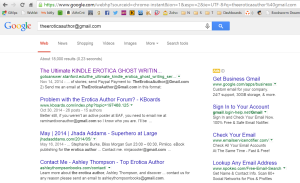
Clicking on the link in the Google results led me here: http://gotoanswer.stanford.edu/?q=The+Ultimate+KINDLE+EROTICA+GHOST+WRITING+Service%3A+Best+Quality%2C+Best+Price
The link has functioned on and off this morning, so here’s a screenshot of where it led when I clicked on February 28:
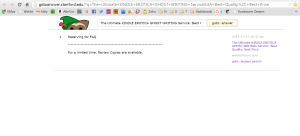
goto: answer is a search engine that indexes material posted on technical forums (according to its front page, http://gotoanswer.stanford.edu). Google seems to have indexed one of its search-result pages, creating a snippet based on what that search was returning at the time. All but one of those forum posts have since been deleted, so when I clicked on the link, I got the above: a mostly blank page, with just the one remaining post. But the author and location of that post caught my eye:

The email address “theeroticaauthor@gmail.com” suggests that Rajesh Lahoti writes erotica, and I (and a bunch of other people) once had a run-in with some Warrior Forum members over on the Kboard Writers’ Cafe. So I followed that “… Ultimate KINDLE EROTICA …” link. It led to a Warrior Forum page on which a member going by “Ghost Author” had apparently posted a thread offering to ghostwrite erotica and had later deleted the posts: http://www.warriorforum.com/warriors-hire/1015285-offer-removed.html
Curious, I clicked through to Ghost Author’s profile: http://www.warriorforum.com/members/ghost-author.html
(I’ve saved and screen-shotted these pages, but to save space, I’ll hold off as long as the links still work.)
There I noticed the link in Ghost Author’s signature, which leads to an ad for his ghost writing services: http://www.warriorforum.com/warriors-hire/1016548-rave-reviews-best-kindle-erotica-ghost-writing-service-content.html
And what do you know? Ghost Author also goes by “Kushal”:

I scrolled down to the thread of queries and responses from Warrior Forum members interested in Kushal’s services and found these comments:
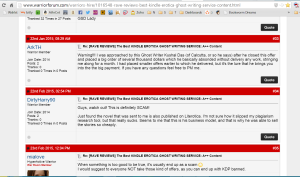
First name and last name: Kushal Das. So, the person who’d emailed me with the kind offer to help me with my “DMCA problem” apparently owns the email address from which the DMCA take-down notice was filed.
Honestly, you could’ve knocked me over with a feather. When I went looking for some possible connection between Kushal Das and Rajesh Lahoti, I wasn’t expecting to find they were the same person. Talk about hitting pay dirt.
So, this person files a dishonest DMCA, gets my book taken down from two sites, and then contacts me, offering to help me deal with it. But why? I’m not a big seller. There’s little monetary potential in stealing my books and none at all in stealing a free one.
A vendetta, maybe? As you might imagine, I looked around for any connections between Kushal Das and past run-ins I’ve had with people. I couldn’t find any. Couldn’t find any connection between his name and me or my books, any connection between Warrior Forum and me or my books, any connections at all.
I was mystified. Why was Kushal Das targeting me?
The evening of February 28, I sent Kushal Das a PDF of the current (not the revised) version of Nolander. Why not? It’s been available as a free PDF download from Smashwords for years.
Then I sat tight and waited for him to email me back. I figured I might never hear from him. Maybe he only contacted me because he wanted the satisfaction of hearing that I was worried. But there was the chance that he wanted something from me. Maybe this was some sort of scam. If so, finding out what he wanted would be good.
On the morning of March 1, Kushal Das emailed me.
Re: Regarding Your DMCA Problem
Kushal Das <kushaldas.usa@gmail.com>
Sun 3/1/2015 8:16 AM
Hi Becca,
Thank you for sending the pdf. I would just like to say one thing about your problem though – please don’t try to upload the new version of Nolander on Amazon without sorting this DMCA thing first. Otherwise, it will get ugly.
You said you have got the complainant’s details. Is the person providing a real looking US/Western Country address and contact details? Abusing DMCA is a serious offence which can result in prison time. So, 99% of the time DMCA abusers use fake name and addresses based in countries like India, China or Russia. It’s because they know you won’t dream of suing someone in those countries. To add to the problem, big sites like Amazon and YouTube don’t verify the complainant’s identity at all. Anyway, in the next couple of days, it be clear where this is heading.
Thanks again for sending the updated novel. Am looking forward to reading it.
Best Regards
Kushal Das
There wasn’t much here to work with. “[I]t will get ugly” sounded like a threat, just as “you can let me know what Amazon is saying and I will see what can be done” had sounded like some kind of solicitation. But it was all vague.
I responded:
RE: Regarding Your DMCA Problem
Becca Mills <bccamlls@gmail.com>
Sun 3/1/2015 9:51 AM
Hi, Kushal. Wow, I hadn’t really thought about potential problems with uploading a revised edition right now. How come that would be bad? Would it upset Amazon?
It’s distressing to hear that companies like Amazon don’t make any effort to verify the complainant’s identity. I hadn’t realized that. It seems like that would open the door for all kinds of abuse. Some angry person using a fake name to file spurious DMCA notices against their ex-spouse — that kind of thing. And you’re right – I can’t think of any way to confirm the info Amazon sent me about the complainant. It could be fake, for all I know.
Well, I’ve written to the complainant. I haven’t heard back yet, but I’m still hoping this is a real reader who’s misunderstood the situation.
All the best,
Becca
I got the word out on Fb and my blog that Nolander was down due to an errant DMCA notice. Since I wanted to keep the dialogue with Kushal Das open, I kept most of what I knew out of those posts.
On March 1, a friend suggested I send Amazon and Smashwords a DMCA counter-notice. A counter-notice is a way of saying to an internet service provider (ISP), “Hey, this material doesn’t infringe anyone’s copyright, and I take responsibility for it.” After receiving a DMCA counter-notice, an ISP is supposed to restore the content within ten days—the matter is no longer their problem.
Of course, Amazon and Smashwords are not ISPs. They’re retailers. It could be that they aren’t bound by the requirement to restore the content they’ve taken down. Retailers can decide what products they want to sell, right? If they want to make those decision capriciously, who’s to stop them?
At any rate, I began drafting the counter-notice, using models I found online.
In researching the issue, I found that Kushal Das (not surprisingly … he/she should know) had been quite right in saying that DMCA notices can be and are used as weapons. Here are some articles and resources on the phenomenon. As you can see, none of them are quite like what’s happening to me. These abuses of the DMCA were motivated by ideology, commercial interests, and so forth. But what could motivate Kushal Das to attack a free book?
This morning, I sat down to my computer to think some more about the problem.
It occurred to me that filing a DMCA counter-notice is risky because, as I understand it, my counter-notice will be forwarded to Rajesh Lahoti/Kushal Das. Do I really want a document containing my full name, mailing address, and account-associated email address in the hands of this person?
I decided I would have to send the notice as “Becca Mills,” with my rented private mailbox as my contact info. It’s not optimal, but I don’t see another path forward.
I very much resent the idea that I might be forced to give identifying information to someone who has behaved fraudulently. Needless to say, I’ve frozen my accounts at the credit bureaus. What a drag.
At first I intended to tell this story after it had all been resolved. That’d be so much more satisfying, wouldn’t it? I planned to keep stringing Rajesh Lahoti/Kushal Das along by email until I figured out what’s motivating all this. And it sure would be nice to be able to report that DMCA counter-notices do work on ebook retailers.
But then I thought better of waiting. Trying to engage with a scammer is asking for trouble, and every day that goes by is a day Nolander is not getting into readers’ hands. The book was getting about twenty downloads a day and generating decent sell-through to the next in the series. Now my business model is in serious jeopardy (Amazon accounted for 68% of my writing income last month, and Barnes & Noble, where Nolander is free through Smashwords, accounted for another 5%).
Last but not least, indie authors need to know about this. And here’s the TL;DR: wholly fraudulent DMCA notices can be used maliciously against independent authors, and registering for U.S. copyright and submitting proof of copyright is not going to suffice as a defense.
Depending on how Amazon and Smashwords react to my counter-notice, we’ll see how well equipped online book retailers are to handle this form of fraud. It seems obvious to me that “you two go sort it out among yourselves” is not an appropriate position when the DMCA complainant is acting in a fraudulent, malicious way. Hopefully Amazon and Smashwords will see it that way as well.
P.S. Just after posting this, I got another email from Kushal Das:
Hi Becca,
Sorry for the late reply, have been very busy today. To confirm, yes, if you upload the new version, it will seriously create problems. Amazon might block it outright. Or even if the new version goes live, if the person who filed the complaint points out the new uploaded version, Amazon will then block it. Amazon will also automatically assume that you are trying to game the system by uploading a slightly modified version of the “plagiarized book”. 3 copyright blocks result in automatic KDP account termination, without any hearing or recourse. So you don’t want to reach 2 blocks.
Very few people realize how shockingly easy it is to abuse DMCA. Since complainants’ identity is never verified (unless you are complaining against a huge best selling author like Dan Brown), anyone holding a grudge against an author can ruin his /her book. Indies are especially vulnerable. It either happens if someone holds a personal grudge, like you pointed out or someone online finds the author’s religious or political views offensive. At least in case of YouTube, most DMCA abuse is related to religious, political or human rights (like gay rights) views.
Please do keep me updated. If it doesn’t get resolved within next couple of days, I will see what options are available for you.
One thing, since I live in a complete opposite time zone, I might take 12 – 24 hours to reply. Hope you don’t mind.
I wish you the best.
Thanks
Kushal
The guy’s good, eh? (Or “the person,” I should say — I keep reminding myself I have no way of knowing who Kushal Das really is, including their gender.) The information about Amazon being provided above might well be true and genuinely helpful. And it’s all so personable. If I hadn’t found that connection between Rajesh Lahoti’s email address and Kushal Das’s Warrior Forum presence, I might’ve packed away my suspicions.
I wonder what “options” Kushal Das would’ve offered me in a few days? Maybe a Nigerian-prince-style suggestion to send along my account numbers? Or maybe nothing. Maybe the point is just to have an inside view of my reactions as I watch my nascent writing career wither way.
P.P.S. Nolander is back up at Smashwords! A big thank you to Smashwords for a quick, personal, and effective response.
Based on what a Smashwords rep said, I think I know how Rajesh Lahoti/Kushal Das showed evidence of prior publication of the material in my book. Apparently, they pointed Smashwords to a 2011 blog post that contained material from Nolander. Now, I don’t think blogs are a good form of evidence. Here on WordPress, when I revise one of my posts, the platform doesn’t add an “edited” line. The post just keeps the original date. If that’s the way most blogging software works, it’d be very easy to use a blog post to “prove” prior making-public of someone else’s writing: you’d just delete the contents of an old post and fill it up with someone else’s book text. Then it’d look like you’d written the book yourself, years earlier.
Ebook retailers need to be on the lookout for this sort of thing, IMO.
Editing to add: At this point (March 4, 2015), quite a few people have told me that the major blogging platforms allow you to set the publication date of a post to whatever you’d like, including in the past. This means ebook retailers and other carriers of digital content need to be awfully careful about using blog posts as evidence of prior publication. Blog posts should be examined by folks with expertise in dating them, not accepted as prima facie evidence.
March 5: A sad update — KDP refuses to unblock Nolander.
Somewhat later on March 5: Good news! Nolander is back up Amazon. Thanks so much to everyone who helped me deal with this. :)
March 7: Aftermath for Nolander, and thoughts on how retailers could react to fraudulent DMCA notices more effectively.


 What’s not so free? The 82 pp. of “sponsored” books this page is hosting. You get one of these sponsored book slots by purchasing advertising through Amazon Marketing Services (AMS). So, each one of those advertised books represents a revenue source for Amazon. I don’t know about you, but I can imagine there might be some temptation to replace all those non-revenue-generating also-boughts with another line of sponsored books. Instead of 82 pp., 164! Surely any company would consider it.
What’s not so free? The 82 pp. of “sponsored” books this page is hosting. You get one of these sponsored book slots by purchasing advertising through Amazon Marketing Services (AMS). So, each one of those advertised books represents a revenue source for Amazon. I don’t know about you, but I can imagine there might be some temptation to replace all those non-revenue-generating also-boughts with another line of sponsored books. Instead of 82 pp., 164! Surely any company would consider it. Like many indie authors, I distribute my books to some retail platforms through Draft2Digital, a company I’ve always found to be competent, responsive, and trustworthy. At some point in the fairly recent past, D2D added Playster to its roster of retail platforms. Playster is a digital entertainment subscription service that includes ebooks, similar to Scribd, Amazon’s Kindle Unlimited program, and the now-defunct Oyster: for $9.95 a month, you can access what Playster advertises as a library of more than 250,000 “premium titles” — “the world’s only truly unlimited ebook service” (
Like many indie authors, I distribute my books to some retail platforms through Draft2Digital, a company I’ve always found to be competent, responsive, and trustworthy. At some point in the fairly recent past, D2D added Playster to its roster of retail platforms. Playster is a digital entertainment subscription service that includes ebooks, similar to Scribd, Amazon’s Kindle Unlimited program, and the now-defunct Oyster: for $9.95 a month, you can access what Playster advertises as a library of more than 250,000 “premium titles” — “the world’s only truly unlimited ebook service” (
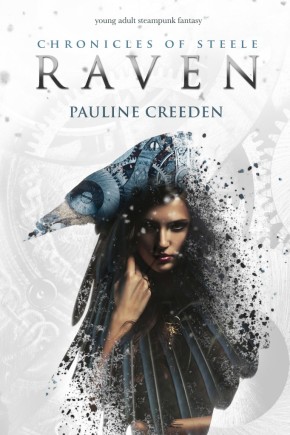 Here, I’ll include an image. Gorgeous, eh?
Here, I’ll include an image. Gorgeous, eh?






